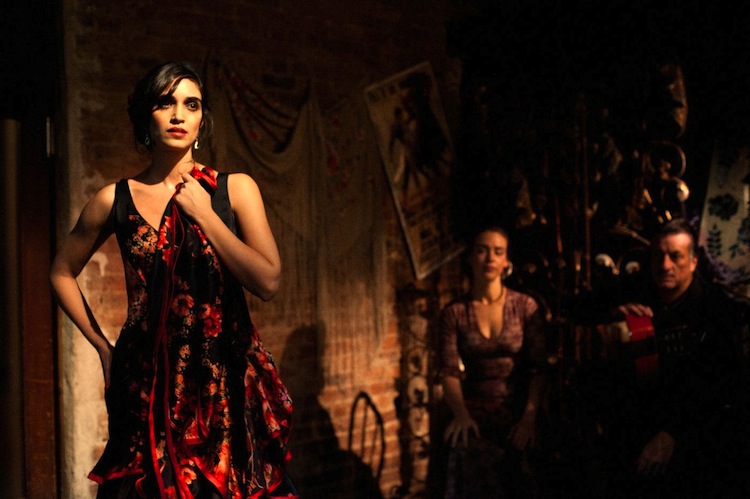By Joe Bendel. In classical string quartets, they say the second violinist is not necessarily subservient to the first. They also say there are no small parts, only small actors – but nobody believes that either. The complicated inter-relationships of an acclaimed string ensemble will be challenged to their breaking point in Yaron Zilberman’s A Late Quartet, which opens this Friday in New York.
The Fugue Quartet has performed together for nearly twenty-five years. Yet, as their quarter century anniversary approaches, their future becomes uncertain. Cellist Peter Mitchell, the senior member of the ensemble, has been diagnosed with early Parkinson’s. He can still function well enough to teach his students, including Alexandra Gelbart, the daughter of second violinist Robert and violist Juliette. However, it is not clear whether he is up to the rigorous demands of concert performance, especially Beethoven’s Opus 131 String Quartet in C-sharp minor, a punishing seven movement piece that offers no resting place for musicians who tackle it.
It quickly becomes apparent that Mitchell was the glue holding the quartet together, even though first violinist Daniel Lerner largely dominated the quartet’s artistic decisions through the force of his personality. He also has romantic history with Juliette Gelbart, one of the many reasons for Robert Gelbart’s burgeoning resentment. Yet, recognizing his talent, the Gelbarts send their daughter to him for personal tutoring, resulting in drama that could permanently rip the Fugue asunder.
Essentially, Quartet is soap opera at its most sophisticated and refined. There is plenty of angst and jealousy at play, but the screenplay (penned by Zilberman and Seth Grossman) really sings when addressing the musicians’ approach to their art. For those coming from the jazz tradition, it is fascinating to watch the debate between Robert Gelbart, who wants to play Beethoven’s Opus without charts to give it a freer, more emotionally spontaneous feeling, and Lerner, who insists on following every little notation, down to the squiggle. Gelbert is not advocating improvisation, just a bit more interpretive latitude in their attack, but for Lerner this would ignore the benefit gleaned from years of careful study.

Although he refrains from eccentric Walkenisms, Christopher Walken still steals nearly every scene he appears in as Mitchell. Knocking some richly written lecture scenes out of the park, one wonders if perhaps he missed his calling as a music teacher. Yet, the most Oscar worthy performance comes from the one member of the quartet not previously nominated. Mark Ivanir really opens up the icily precise Lerner, markedly laying bare the messy insecurities so many great artists share. In contrast, as the Gelbarts, Philip Seymour Hoffman and Catherine Keener stay on familiar ground, depicting the petty tribulations of the privileged class. We have seen this from them both before, but at least Zilberman shows them bickering in interesting places, like Sotheby’s.
Perhaps Zilberman’s most important collaborator is the Brentano String Quartet, whose elegantly elegiac rendition of the Opus powerfully underscores the film. Their fans will also enjoy seeing cellist Nina Lee appearing as herself, whom Mitchell is determined to recruit as his replacement. Memorably capturing the heart and milieu of classical music, Quartet deserves attention during award season, particularly for Ivanir and Walken. Yet, as a true chamber piece, it may lack the bombast the academy responds to. Recommended for classical listeners and those who appreciate the drama inherent in creative differences, A Late Quartet opens this Friday (11/2) in New York at the Landmark Sunshine, or so we all hope.
LFM GRADE: B
Posted on October 30th, 2012 at 1:16pm.